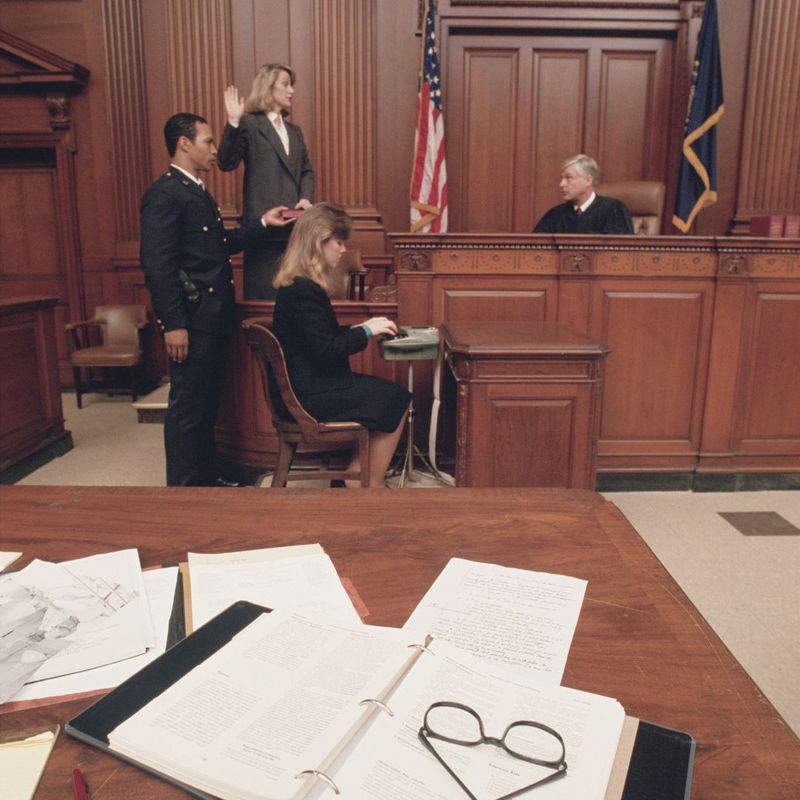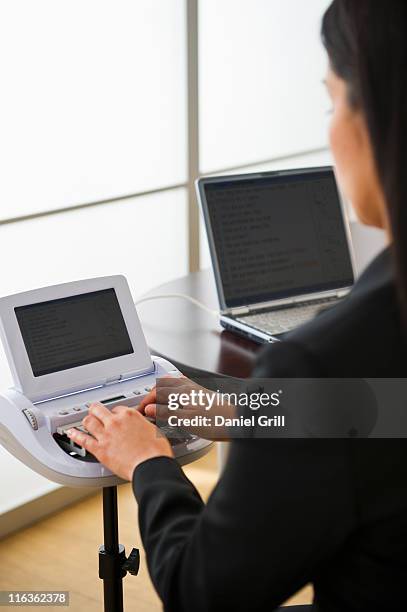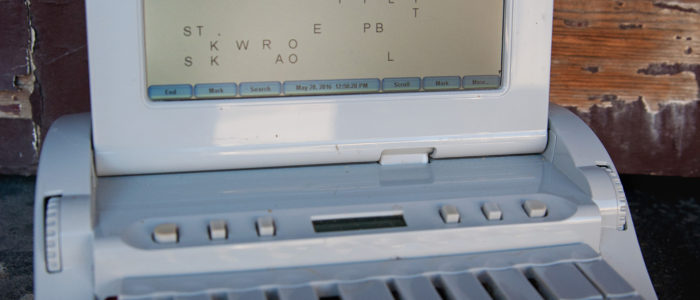Interview Tips for Landing Your First Job as a Court Typist
Interview Tips for Landing Your First Job as a Court Typist
Blog Article
Discover the Vital Abilities and Responsibilities of a Court Typist in Today's Lawful Landscape
As a court typist, you hold a critical setting in the legal system. Your abilities surpass just keying; they include understanding intricate legal terms and procedures while guaranteeing precision in every document. You team up closely with courts and lawyers, making your role vital for reliable communication. But what specific abilities do you need, and just how can you adapt to the ever-evolving technical landscape? Let's discover this further.
The Function of a Court Typist in the Judicial System
As the foundation of the judicial system, a court typist plays an important function in guaranteeing that legal procedures are properly recorded. You are in charge of recording everything from witness testaments to judges' judgments, catching every detail with accuracy. Your work helps maintain a irreversible and clear document of court tasks, which is essential for future referral and appeals.In the courtroom, you're often the unrecognized hero, quietly guaranteeing that all talked words become written documents. You keep privacy, understanding the delicate nature of legal issues. You also team up closely with clerks, lawyers, and judges to guarantee the smooth flow of information. By functioning successfully under stress, you add to the overall performance of the judicial procedure. Your interest to detail and dedication to precision not only maintain the stability of the court however also support the more comprehensive search of justice in culture.
Vital Abilities Needed for Court Typists
Court typists need a special blend of skills to master their crucial function within the judicial system. Firstly, you should have excellent keying skills, frequently achieving rates of 70 words per min or more. Precision is essential; also a minor error can result in considerable misconceptions in legal records. You'll likewise require strong focus to detail, guaranteeing every word is recorded correctly.Additionally, great business skills are essential for handling several cases and records efficiently. Being tech-savvy is vital, as you'll use numerous software application for word handling and file monitoring. Strong interaction abilities assist you connect with courts, legal representatives, and various other court workers effectively.Lastly, a sense of professionalism and trust and discretion is a must, as you'll deal with sensitive information daily. By refining these skills, you'll be well-prepared to contribute significantly to the court room setting.
Comprehending Legal Terms and Procedures
As a court typist, you require to comprehend essential legal terms and treatments to do your job successfully. Comprehending these concepts not just helps you record accurately but also assures you can adhere to the circulation of court proceedings. Let's check out the necessary lawful vocabulary and an overview of court processes you must recognize.

Key Legal Terms
Understanding key lawful terms is essential for any person functioning in a court room environment. You'll regularly experience terms like "complainant," which describes the individual initiating a suit, and "defendant," that replies to the allegations. Understanding the distinction between "civil" and "criminal" situations aids you grasp the context of the proceedings. Knowledge with "subpoena" assurances you comprehend the legal records engaging witnesses to affirm. Furthermore, terms like "evidence" and "testament" are vital, as they associate directly to the details offered in court. Understanding these terms not just boosts your efficiency as a court typist yet also guarantees that you contribute to the precision and clarity of legal papers. Your role rests on precise terminology, so don't take it lightly!
Court Procedures Summary
Experience with vital legal terms establishes the stage for comprehending court treatments. Understanding just how a court room features is crucial for any kind of court typist. You'll come across processes like arraignments, where accuseds hear charges, and movements, which are requests for a court judgment. Acquaint on your own with the roles of judges, clerks, and attorneys, as each plays an important component in proceedings. Recognizing the flow of a test-- from jury selection to shutting arguments-- helps you precisely catch the procedures - court typist. Furthermore, understanding the relevance of maintaining a precise and impartial document can't be overemphasized. By understanding these elements, you'll enhance your effectiveness in recording crucial court tasks and contribute considerably to the lawful process. Your duty is essential in maintaining the integrity of court records
The Effect of Innovation on Court Typing
Modern technology's transformed court inputting in substantial methods. With electronic transcription tools, you can increase effectiveness and accuracy, making your work resource easier than ever. Plus, remote court proceedings have actually transformed how you approach your work, requiring flexibility to new styles and technologies.
Digital Transcription Tools
As digital transcription tools remain to develop, they're transforming the method court typists execute their obligations. These devices enhance the transcription process, allowing you to capture talked words accurately and effectively. With voice recognition software application, you can transcribe real-time procedures, minimizing hands-on input and minimizing errors.Moreover, cloud-based systems enable easy access to files, so you can function collaboratively with lawful teams and assure everybody's on the same web page. Automated format features save you time on recurring tasks, allowing you focus on material quality.Additionally, digital tools boost safety, shielding delicate details via encrypted storage and regulated access. By embracing these innovations, you can boost your productivity and maintain the high standards required in the legal area.
Remote Court Procedures
The surge of remote court procedures has actually greatly altered the landscape for court typists. You currently rely upon innovation to record and transcribe live hearings from your office or home. Familiarity with video clip conferencing systems is necessary, as you'll need to navigate them effortlessly to assure an accurate record. You'll likewise need to take care of audio quality, as background noise or link concerns can interrupt your job. Furthermore, remote process require fast thinking; you might need to clear up statements or demand repeats in real-time. Staying organized and effective is essential, as deadlines remain tight. Embracing these technological improvements not just enhances your skills but also ensures you continue to be a vital property in today's advancing lawful environment.
Accuracy and Focus to Detail in Transcription
Precision and interest to detail are vital in transcription, specifically for Read More Here court typists. court typist. When you're transcribing lawful process, every word matters. A single error can alter the meaning of a statement, possibly influencing the end result of a situation. You have to listen carefully, guaranteeing that you catch every subtlety and inflection in the speaker's voice.Your ability to catch typos and grammatical errors is necessary. You do not simply type; you verify that the final document is an accurate depiction of what was claimed in court. This calls for an eager eye and a detailed understanding of legal terminology.Moreover, you'll need to be familiar with various accents and speaking styles, as courts can hold a range of audio speakers. By developing your accuracy and interest to information, you'll keep the integrity of legal files and add noticeably to the judicial process. Your diligence in this field absolutely makes a distinction

Time Monitoring and Business Abilities
While handling numerous tasks, effective time administration and organizational abilities are important for court typists. You'll commonly handle different target dates, from recording court process to preparing legal records. Prioritizing your workload is crucial; identify urgent jobs and tackle them first to guarantee prompt submissions.Organizational abilities come right into play when you're sorting through case data, transcripts, and notes. Keeping whatever neatly classified not only conserves time but also minimizes the danger of error. Using devices like calendars, order of business, or specialized software can help you stay on track and handle your time effectively.Moreover, setting particular goals for each and every job session can boost your performance. Damage bigger tasks into smaller sized jobs to make them extra convenient. By sharpening these abilities, you'll not only boost your effectiveness yet also add substantially to the smooth procedure of the lawful process, ensuring every little thing runs like clockwork.
Proceeding Education and Expert Growth Opportunities
Purchasing your skills does not quit with time monitoring and organization. As a court typist, you'll locate that continuing education and learning and specialist development are necessary to staying competitive in the lawful field. Try to find workshops or on the internet courses concentrating on advanced keying strategies, lawful terminology, and transcription software program. These can hone your skills and assist you adapt to the current technologies.Networking is equally important. Sign up with professional organizations like the National Court Reporters Organization (NCRA) or neighborhood legal associations. They typically use sources, training sessions, and conferences that can improve your understanding and attach you with peers.Don' t forget about qualification programs that can improve your trustworthiness and bankability. Staying updated with the most recent patterns and best techniques in lawful documentation will enhance your efficiency and accuracy, making you an indispensable asset to any kind of legal group. Invest in your growth, and you'll enjoy the incentives throughout your occupation.
Frequently Asked Inquiries
What Is the Normal Wage Range for a Court Typist?
A court typist's normal income ranges from $30,000 to $55,000 annually, relying on experience and place. You could also find opportunities for development with additional abilities, leading to enhanced pay in the lawful area.

Are Court Typists Required to Have a Lawful Level?
Court typists do not need a legal level, however having one can be beneficial. You'll frequently find that solid inputting skills and understanding of lawful terminology are more crucial for success in this function.
What Are the Job Hours for a Court Typist?

How Do Court Typists Make Certain Confidentiality in Their Job?
You assure privacy by safely taking care of delicate documents, utilizing encrypted software application, and adhering to rigorous procedures. You stay mindful of personal privacy laws and only share information with licensed workers, keeping rely on the judicial procedure.
Can Court Typists Work Remotely or Freelance?
Yes, you can work remotely or freelance as a court typist, especially if you have reliable modern technology and a safe environment. Several attorneys currently embrace remote job, offering versatility and opportunities for independent typists. As the backbone of the judicial system, a view court typist plays an important function in assuring that legal process are accurately documented. As a court typist, you require to realize essential lawful terms and procedures to perform your task efficiently. Grasping these terms not only boosts your efficiency as a court typist however additionally guarantees that you add to the precision and clarity of legal documents. The increase of remote court process has actually greatly changed the landscape for court typists. As a court typist, you'll discover that continuing education and learning and expert growth are crucial to remaining competitive in the legal field.
Report this page